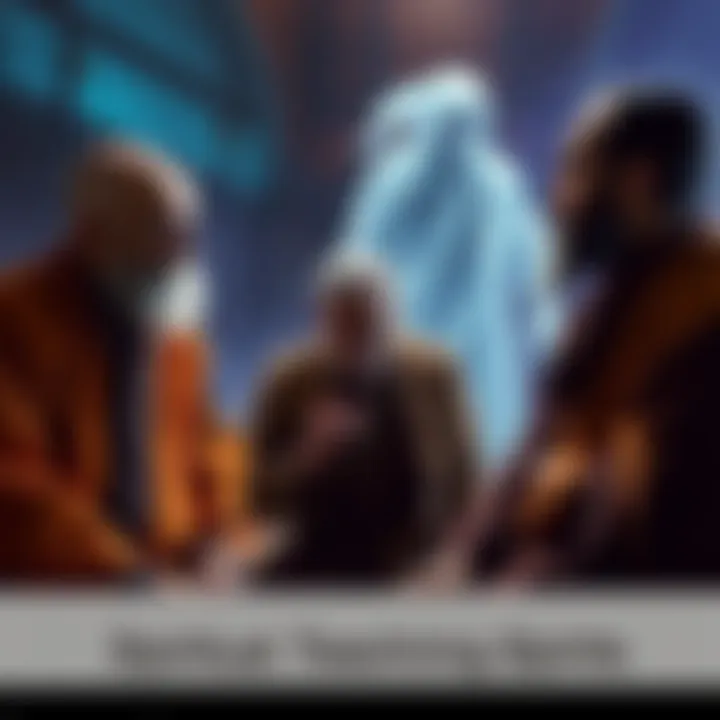Non-Dual Teachers and the Spirit Debate | Exploring Beliefs and Experiences
Edited By
Nora Sinclair

In recent discussions, prominent non-dual teachers like Eckhart Tolle and Byron Katie are questioned about their avoidance of the spiritual realm, particularly spirits. This has sparked a lively debate among people experiencing paranormal phenomena and those who emphasize inner awareness instead.
Context of the Discourse
The conversation highlights an ongoing tension between traditional spiritual beliefs and non-dual teachings, which often focus on enlightenment through self-realization rather than external phenomena. This divide raises intriguing questions about spirituality in today's context while revealing a spectrum of opinions from followers of these teachings.
Key Themes from the Discussion
Reality vs. Illusion
Many supporters argue that belief in spirits stems from human imagination. As one commenter noted, "Believing in spirits is identifying with ideas created by human imagination." This perspective aligns with the non-dual teaching focus on what is genuinely real versus transient illusions.
Internal vs. External Focus
A recurring viewpoint suggests that the focus of non-dual teachings is on inward exploration. One user stated, "Non-dual teachings point people inward toward the essence of their true, eternal selves." While some promote the idea of looking within, others feel this overlooks external spiritual experiences.
Rethinking Spiritual Awareness
There's debate about the limitations of spiritual awakening among non-dual teachers. As one person pointed out, "Just because those teachers are spiritually awake in one way doesn't mean they're awake in another way." This opens the conversation on how awakening manifests in different forms.
"Who looks outside, dreams; who looks inside, awakes." - Carl Jung
Notable Perspectives
Some critics argue that focusing on metaphysical knowledge risks fostering delusion. A prominent comment underscored this by saying, "Metaphysical knowledge feeds the mind and delusion." Yet, supporters maintain that these teachings are aimed at a higher understanding beyond sensational experiences.
Interestingly, Eckhart Tolle has acknowledged spirits in various contexts, especially linking them to concepts like angels through texts such as "A Course in Miracles." Still, many followers question whether this outlook serves the core of non-dual teachings, which prioritize self-awareness and enlightenment as a path to understanding oneself and the universe.
Insights and Takeaways
🔍 Many believe discussions on spirits complicate the core teachings of non-duality.
📜 "Who looks outside, dreams; Who looks inside, awakes." - Carl Jung
⚠️ Concerns persist about blending spiritual awakenings with external phenomena and potential misconceptions.
As this conversation evolves, the distinction between looking outward for spirits and inward for self-awareness continues to fuel debates in spiritual communities. What do you think? Does focusing inward negate the existence of external spiritual entities?
What Lies Ahead for Non-Dual Teachers and Spirit Discussions?
There’s a strong chance that teachers like Eckhart Tolle and Byron Katie will face increasing pressure to address the topic of spirits more openly in their teachings. As more people report paranormal experiences, the demand for clarity on spiritual matters may rise. Experts estimate around 60% of individuals interested in spirituality today are likely to seek guidance that bridges the gap between non-dual awareness and spirit phenomena. This could lead to a significant shift in teachings to consider the broader spectrum of spiritual experiences that people encounter, blending them with non-dual approaches.
A Lesson from History: When Science Met Spirituality
Looking back, the 19th century marked a pivotal moment when burgeoning scientific discoveries began to clash with spiritual beliefs. The age of enlightenment saw scientists like Michael Faraday and Thomas Edison exploring the natural world, pushing against traditional views of spirits and the supernatural. Similarly, today’s dialogue around non-dual teachings and spirit beliefs represents a confrontation between established spiritual frameworks and emerging experiences. Just as science once forced a reevaluation of belief systems, the current movement may well reshape the landscape of spiritual understanding, blending introspection with outer phenomena.
